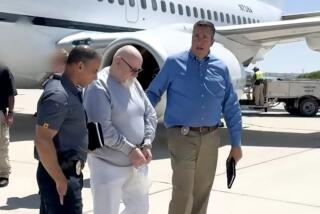High Court Upholds DNA Precedent in Ventura Case
- Share via
The California Supreme Court cleared the way Thursday for the continued use of DNA evidence in criminal cases when it refused to hear a Ventura woman’s appeal of her conviction for murdering a worker at the Top Hat burger stand in 1988.
The justices let stand a precedent-setting state appeals court ruling issued last October that upheld the conviction of Lynda Axell for the slaying of Top Hat employee George White. White was found stabbed to death at the popular Ventura eatery on Feb. 24, 1988.
The October ruling by the 2nd District Court of Appeal unanimously rejected Axell’s attorney’s claim that “genetic fingerprinting,” used to match Axell with strands of hair found in the dead man’s hand, has not been proven scientifically reliable.
Prosecutors nationwide have relied increasingly on DNA testing in recent years. By recent count, high courts in eight states had upheld its use as evidence, while top courts in two states--Massachusetts and Minnesota--had turned it down. Thursday’s action marked the first time the issue has reached the California Supreme Court.
DNA, or deoxyribonucleic acid, is genetic material that is unique to each individual. By comparing a suspect’s DNA pattern with samples of blood, semen or other human tissue at a crime scene, investigators have been able to show the suspect is guilty--or, in some instances, innocent.
Prosecutors said Axell stabbed White to death when he caught her stealing money from the restaurant.
In the non-jury trial, the DNA evidence was the sole proof used against her. Laboratory analysts said the odds that the hair came from someone other than Axell were 1 in 6 billion.
Ventura County Superior Court Judge Lawrence Storch found Axell guilty of murder and attempted robbery and sentenced her to 25 years to life in prison. Now 37, Axell is incarcerated at the California Institution for Women at Frontera.
In an appeal to the state high court, Sharon M. Jones, a lawyer for Axell, urged that the appellate ruling be overturned. Jones argued that faulty testing procedures can jeopardize the reliability of genetic fingerprinting and that there is no scientific consensus about the proper methods of calculating statistical probabilities of DNA matchups.
Jones could not be reached for comment Thursday.
However, Deputy Dist. Atty. Carol Nelson, who prosecuted Axell, said the case will help lawyers to build such a foundation and to make DNA as acceptable a form of identification as fingerprints.
DNA evidence helps pinpoint the identity of a suspect or rule the person out, Nelson said. Except for identical twins, whose DNA patterns match each other, it is improbable that any other two persons’ DNA would match, she said.
The justices Thursday issued a brief order denying review. Only Justice Edward A. Panelli voted to hear the case. Four votes from the seven-member court are required for review.
Times staff writer Mack Reed contributed to this story.
More to Read
Sign up for Essential California
The most important California stories and recommendations in your inbox every morning.
You may occasionally receive promotional content from the Los Angeles Times.












